-
75 results in Exploration of Asthma & AllergySort byMost Viewed
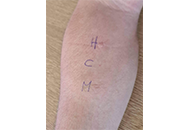 Isolated lettuce allergy in a medical student: case report and review of the literatureOpen AccessCase ReportLettuce allergy is uncommon and usually attributed to lipid transfer protein (LTP) sensitization. Most LTP-sensitized patients present with heterogeneous symptoms not only to lettuce, but to a large [...] Read more.Kyle Alexander ... Nicolaos NicolaouPublished: April 26, 2023 Explor Asthma Allergy. 2023;1:20–27
Isolated lettuce allergy in a medical student: case report and review of the literatureOpen AccessCase ReportLettuce allergy is uncommon and usually attributed to lipid transfer protein (LTP) sensitization. Most LTP-sensitized patients present with heterogeneous symptoms not only to lettuce, but to a large [...] Read more.Kyle Alexander ... Nicolaos NicolaouPublished: April 26, 2023 Explor Asthma Allergy. 2023;1:20–27
DOI: https://doi.org/10.37349/eaa.2023.00004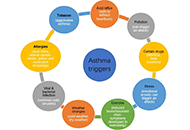 Management of asthma using probioticsOpen AccessReviewAsthma is one of the most common respiratory diseases in humans throughout the world. The illness continues to be the most prevalent cause of respiratory morbidity and affects both adults and childr [...] Read more.Amar P. Garg ... Bajeerao PatilPublished: February 20, 2024 Explor Asthma Allergy. 2024;2:9–32
Management of asthma using probioticsOpen AccessReviewAsthma is one of the most common respiratory diseases in humans throughout the world. The illness continues to be the most prevalent cause of respiratory morbidity and affects both adults and childr [...] Read more.Amar P. Garg ... Bajeerao PatilPublished: February 20, 2024 Explor Asthma Allergy. 2024;2:9–32
DOI: https://doi.org/10.37349/eaa.2024.00026
This article belongs to the special issue Asthma and its Relationship with Psychological and Psychopathological Factors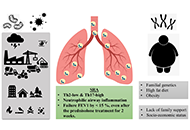 Molecular mechanisms of steroid-resistant asthmaOpen AccessReviewSteroid-resistant asthma (SRA) is clinically significant, approximately 10–15% of individuals with asthma do not exhibit a positive response to standard treatments. While this subset represents a [...] Read more.Mandya V. Greeshma ... Padukudru Anand MaheshPublished: November 20, 2023 Explor Asthma Allergy. 2023;1:174–185
Molecular mechanisms of steroid-resistant asthmaOpen AccessReviewSteroid-resistant asthma (SRA) is clinically significant, approximately 10–15% of individuals with asthma do not exhibit a positive response to standard treatments. While this subset represents a [...] Read more.Mandya V. Greeshma ... Padukudru Anand MaheshPublished: November 20, 2023 Explor Asthma Allergy. 2023;1:174–185
DOI: https://doi.org/10.37349/eaa.2023.00018
This article belongs to the special issue Epidemiology of Asthma - Global Perspectives, Host and Environmental Risk Factors and Strategies for Mitigation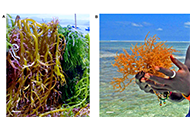 Exploring the therapeutic potential of algae derived food and diet factors in allergy and inflammationOpen AccessReviewSeaweed, a rich source of bioactive compounds, has gained increasing attention for its potential therapeutic applications in allergy and inflammation. This review examines the current scientific lit [...] Read more.Leonel Pereira, Ana ValadoPublished: April 23, 2024 Explor Asthma Allergy. 2024;2:127–147
Exploring the therapeutic potential of algae derived food and diet factors in allergy and inflammationOpen AccessReviewSeaweed, a rich source of bioactive compounds, has gained increasing attention for its potential therapeutic applications in allergy and inflammation. This review examines the current scientific lit [...] Read more.Leonel Pereira, Ana ValadoPublished: April 23, 2024 Explor Asthma Allergy. 2024;2:127–147
DOI: https://doi.org/10.37349/eaa.2024.00035
This article belongs to the special issue The Different Faces of Food Allergy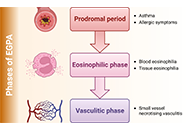 New therapeutic approaches with biological drugs for eosinophilic granulomatosis with polyangiitisOpen AccessReviewEosinophilic granulomatosis with polyangiitis (EGPA) is a multiorganic syndrome that affects the cardiovascular, neurologic, renal, and gastrointestinal systems with an incidence ranging from 0 case [...] Read more.Alejandra Carrón-Herrero ... Giovanni PaolettiPublished: June 08, 2023 Explor Asthma Allergy. 2023;1:31–48
New therapeutic approaches with biological drugs for eosinophilic granulomatosis with polyangiitisOpen AccessReviewEosinophilic granulomatosis with polyangiitis (EGPA) is a multiorganic syndrome that affects the cardiovascular, neurologic, renal, and gastrointestinal systems with an incidence ranging from 0 case [...] Read more.Alejandra Carrón-Herrero ... Giovanni PaolettiPublished: June 08, 2023 Explor Asthma Allergy. 2023;1:31–48
DOI: https://doi.org/10.37349/eaa.2023.00006
This article belongs to the special issue The Era of Biologics in Allergy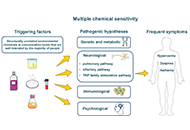 Multiple chemical sensitivity: a review of its pathophysiologyOpen AccessReviewMultiple chemical sensitivity (MCS) is an unexplained acquired medical condition that includes multiple, vague, recurrent, and non-specific symptoms in different organs. They are attributed to expos [...] Read more.Cătălina Elena Lavric ... Frédéric de BlayPublished: July 29, 2024 Explor Asthma Allergy. 2024;2:350–362
Multiple chemical sensitivity: a review of its pathophysiologyOpen AccessReviewMultiple chemical sensitivity (MCS) is an unexplained acquired medical condition that includes multiple, vague, recurrent, and non-specific symptoms in different organs. They are attributed to expos [...] Read more.Cătălina Elena Lavric ... Frédéric de BlayPublished: July 29, 2024 Explor Asthma Allergy. 2024;2:350–362
DOI: https://doi.org/10.37349/eaa.2024.00050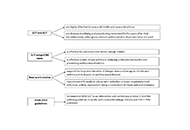 Allergen-specific immunotherapy for allergic asthma: What’s new?Open AccessMini ReviewAllergen-specific immunotherapy for inhalant allergies, using allergen extracts of proven value, is highly effective in selected patients with allergic rhinoconjunctivitis and allergic asthma. Both [...] Read more.Chiara Asperti ... Stephen R. DurhamPublished: February 29, 2024 Explor Asthma Allergy. 2024;2:76–84
Allergen-specific immunotherapy for allergic asthma: What’s new?Open AccessMini ReviewAllergen-specific immunotherapy for inhalant allergies, using allergen extracts of proven value, is highly effective in selected patients with allergic rhinoconjunctivitis and allergic asthma. Both [...] Read more.Chiara Asperti ... Stephen R. DurhamPublished: February 29, 2024 Explor Asthma Allergy. 2024;2:76–84
DOI: https://doi.org/10.37349/eaa.2024.00030
This article belongs to the special issue Precision Medicine in Allergy and Rhinology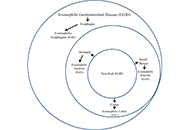 Eosinophilic gastrointestinal diseases: current perspectives on pathogenesis and managementOpen AccessReviewEosinophilic gastrointestinal diseases (EGIDs) are a group of chronic conditions, characterized by an excessive accumulation of eosinophils in various areas of the mucosal of the gastrointestinal (G [...] Read more.Georgia Papaiakovou ... Nikoletta RovinaPublished: June 07, 2024 Explor Asthma Allergy. 2024;2:205–218
Eosinophilic gastrointestinal diseases: current perspectives on pathogenesis and managementOpen AccessReviewEosinophilic gastrointestinal diseases (EGIDs) are a group of chronic conditions, characterized by an excessive accumulation of eosinophils in various areas of the mucosal of the gastrointestinal (G [...] Read more.Georgia Papaiakovou ... Nikoletta RovinaPublished: June 07, 2024 Explor Asthma Allergy. 2024;2:205–218
DOI: https://doi.org/10.37349/eaa.2024.00041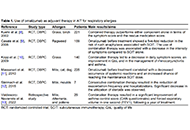 Biologic drugs and allergen immunotherapy: potential alliesOpen AccessReviewAllergen-specific immunotherapy (AIT) is a proven efficacy treatment for allergic rhinitis (AR), asthma, and Hymenoptera venom allergy, but its use in food allergy (FA) is still under investigation. [...] Read more.Palma Carlucci ... Danilo Di BonaPublished: October 20, 2023 Explor Asthma Allergy. 2023;1:126–141
Biologic drugs and allergen immunotherapy: potential alliesOpen AccessReviewAllergen-specific immunotherapy (AIT) is a proven efficacy treatment for allergic rhinitis (AR), asthma, and Hymenoptera venom allergy, but its use in food allergy (FA) is still under investigation. [...] Read more.Palma Carlucci ... Danilo Di BonaPublished: October 20, 2023 Explor Asthma Allergy. 2023;1:126–141
DOI: https://doi.org/10.37349/eaa.2023.00014
This article belongs to the special issue The Era of Biologics in Allergy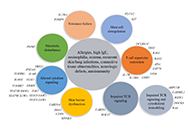 Food allergy as one of the faces of primary immunodeficiencyOpen AccessMini ReviewFood allergy is characterized by an abnormal immune reaction that occurs reproducibly upon exposure to a specific food. This immune response can lead to a variety of symptoms, the prevalence of food [...] Read more.Polina Kostova ... Guergana PetrovaPublished: February 29, 2024 Explor Asthma Allergy. 2024;2:65–75
Food allergy as one of the faces of primary immunodeficiencyOpen AccessMini ReviewFood allergy is characterized by an abnormal immune reaction that occurs reproducibly upon exposure to a specific food. This immune response can lead to a variety of symptoms, the prevalence of food [...] Read more.Polina Kostova ... Guergana PetrovaPublished: February 29, 2024 Explor Asthma Allergy. 2024;2:65–75
DOI: https://doi.org/10.37349/eaa.2024.00029
This article belongs to the special issue The Different Faces of Food Allergy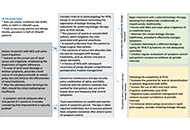 A mini-update on chronic rhinosinusitisOpen AccessReviewChronic rhinosinusitis (CRS) is an inflammatory disorder of the paranasal sinuses and the nasal cavity lasting longer than 12 weeks. This disease is a common clinical syndrome with significant monet [...] Read more.Sepideh Darougar ... Pantea Bozorg SavojiPublished: September 19, 2024 Explor Asthma Allergy. 2024;2:473–484
A mini-update on chronic rhinosinusitisOpen AccessReviewChronic rhinosinusitis (CRS) is an inflammatory disorder of the paranasal sinuses and the nasal cavity lasting longer than 12 weeks. This disease is a common clinical syndrome with significant monet [...] Read more.Sepideh Darougar ... Pantea Bozorg SavojiPublished: September 19, 2024 Explor Asthma Allergy. 2024;2:473–484
DOI: https://doi.org/10.37349/eaa.2024.00059
This article belongs to the special issue Update on Chronic RhinoSinusitis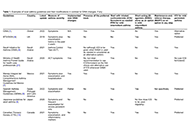 Impact of the GINA asthma guidelines 2019 revolution on local asthma guidelines and challenges: special attention to the GCC countriesOpen AccessReviewThe Global Initiative for Asthma (GINA) provides the most comprehensive and frequently updated guidelines for the management of asthma. The primary aim of guidelines is to bridge the gap between res [...] Read more.Riyad Allehebi, Hamdan AL-JahdaliPublished: October 10, 2023 Explor Asthma Allergy. 2023;1:115–125
Impact of the GINA asthma guidelines 2019 revolution on local asthma guidelines and challenges: special attention to the GCC countriesOpen AccessReviewThe Global Initiative for Asthma (GINA) provides the most comprehensive and frequently updated guidelines for the management of asthma. The primary aim of guidelines is to bridge the gap between res [...] Read more.Riyad Allehebi, Hamdan AL-JahdaliPublished: October 10, 2023 Explor Asthma Allergy. 2023;1:115–125
DOI: https://doi.org/10.37349/eaa.2023.00013
This article belongs to the special issue The Global Picture of Asthma after Guideline Changes and the COVID Pandemics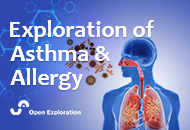 Small airway dysfunction and obesity in asthmatic patients: a dangerous liaison?Open AccessReviewAsthma is a chronic condition characterized by inflammation throughout the entire bronchial airways. Recent findings suggest that ventilation inhomogeneity and small airway dysfunction (SAD) play a [...] Read more.Jack Pepys ... Marcello CottiniPublished: August 15, 2023 Explor Asthma Allergy. 2023;1:73–88
Small airway dysfunction and obesity in asthmatic patients: a dangerous liaison?Open AccessReviewAsthma is a chronic condition characterized by inflammation throughout the entire bronchial airways. Recent findings suggest that ventilation inhomogeneity and small airway dysfunction (SAD) play a [...] Read more.Jack Pepys ... Marcello CottiniPublished: August 15, 2023 Explor Asthma Allergy. 2023;1:73–88
DOI: https://doi.org/10.37349/eaa.2023.00010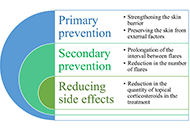 Current approach to moisturizer and emollient utilization in atopic dermatitis: a reviewOpen AccessReviewAtopic dermatitis (AD) is a chronic inflammatory skin disease that primarily affects the barrier function of the skin in patients. The condition has been documented to cause xerosis in patients from [...] Read more.Serap MadenPublished: August 27, 2024 Explor Asthma Allergy. 2024;2:441–449
Current approach to moisturizer and emollient utilization in atopic dermatitis: a reviewOpen AccessReviewAtopic dermatitis (AD) is a chronic inflammatory skin disease that primarily affects the barrier function of the skin in patients. The condition has been documented to cause xerosis in patients from [...] Read more.Serap MadenPublished: August 27, 2024 Explor Asthma Allergy. 2024;2:441–449
DOI: https://doi.org/10.37349/eaa.2024.00056
This article belongs to the special issue Atopic Dermatitis – Pathology and Treatment modalities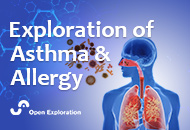 Impulse oscillometry for the evaluation and management of pediatric asthmaOpen AccessReviewAsthma is the most common chronic disease during childhood. While most of characteristic structural changes in asthma have been identified in the large airways, there is a growing recognition of per [...] Read more.Pasquale Comberiati ... Diego PeroniPublished: December 19, 2023 Explor Asthma Allergy. 2023;1:219–229
Impulse oscillometry for the evaluation and management of pediatric asthmaOpen AccessReviewAsthma is the most common chronic disease during childhood. While most of characteristic structural changes in asthma have been identified in the large airways, there is a growing recognition of per [...] Read more.Pasquale Comberiati ... Diego PeroniPublished: December 19, 2023 Explor Asthma Allergy. 2023;1:219–229
DOI: https://doi.org/10.37349/eaa.2023.00022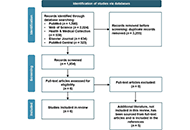 Catching your breath: unraveling the intricate connection between panic disorder and asthmaOpen AccessReviewRespiratory changes are often associated with anxiety disorders, particularly panic disorder (PD). Individuals experiencing PD are subjected to unexpected panic attacks, marked by overwhelming anxie [...] Read more.Graziella Chiara PrezzaventoPublished: April 08, 2024 Explor Asthma Allergy. 2024;2:97–110
Catching your breath: unraveling the intricate connection between panic disorder and asthmaOpen AccessReviewRespiratory changes are often associated with anxiety disorders, particularly panic disorder (PD). Individuals experiencing PD are subjected to unexpected panic attacks, marked by overwhelming anxie [...] Read more.Graziella Chiara PrezzaventoPublished: April 08, 2024 Explor Asthma Allergy. 2024;2:97–110
DOI: https://doi.org/10.37349/eaa.2024.00032
This article belongs to the special issue Asthma and its Relationship with Psychological and Psychopathological Factors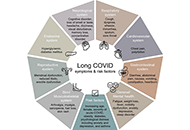 A treatable traits approach for asthma in a post-COVID eraOpen AccessReviewAs a novel respiratory viral infection, coronavirus disease 2019 (COVID-19) has influenced asthma in unpredictable ways. In the post-COVID era, there is a need to review asthma care and the new chal [...] Read more.Yuto Hamada ... Peter Gerard GibsonPublished: June 27, 2024 Explor Asthma Allergy. 2024;2:287–300
A treatable traits approach for asthma in a post-COVID eraOpen AccessReviewAs a novel respiratory viral infection, coronavirus disease 2019 (COVID-19) has influenced asthma in unpredictable ways. In the post-COVID era, there is a need to review asthma care and the new chal [...] Read more.Yuto Hamada ... Peter Gerard GibsonPublished: June 27, 2024 Explor Asthma Allergy. 2024;2:287–300
DOI: https://doi.org/10.37349/eaa.2024.00045
This article belongs to the special issue The Global Picture of Asthma after Guideline Changes and the COVID Pandemics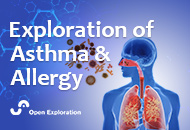 Eosinophilic gastrointestinal disorders: new perspectives and the emerging role of biological therapiesOpen AccessReviewThe advent of biological drugs has opened up new therapeutic possibilities in the field of eosinophilic gastro-intestinal diseases (EGIDs). EGIDs are chronic inflammatory diseases of the gastrointes [...] Read more.Francesca Losa, Arianna CingolaniPublished: June 30, 2023 Explor Asthma Allergy. 2023;1:60–72
Eosinophilic gastrointestinal disorders: new perspectives and the emerging role of biological therapiesOpen AccessReviewThe advent of biological drugs has opened up new therapeutic possibilities in the field of eosinophilic gastro-intestinal diseases (EGIDs). EGIDs are chronic inflammatory diseases of the gastrointes [...] Read more.Francesca Losa, Arianna CingolaniPublished: June 30, 2023 Explor Asthma Allergy. 2023;1:60–72
DOI: https://doi.org/10.37349/eaa.2023.00009
This article belongs to the special issue The Era of Biologics in Allergy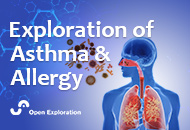 TSLP and asthma: fellow travelersOpen AccessMini ReviewThe incidence of asthma, a heterogeneous inflammatory disease affecting over 300 million people worldwide, continues to increase in developed countries. Human epithelial cells (ECs) express the alar [...] Read more.David El-Qutob, Antonio LetranPublished: April 14, 2023 Explor Asthma Allergy. 2023;1:4–10
TSLP and asthma: fellow travelersOpen AccessMini ReviewThe incidence of asthma, a heterogeneous inflammatory disease affecting over 300 million people worldwide, continues to increase in developed countries. Human epithelial cells (ECs) express the alar [...] Read more.David El-Qutob, Antonio LetranPublished: April 14, 2023 Explor Asthma Allergy. 2023;1:4–10
DOI: https://doi.org/10.37349/eaa.2023.00002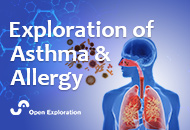 Exploration of Asthma & Allergy, where science, evidence, and vision can improve clinical practiceOpen AccessEditorialGiorgio Walter Canonica, Enrico HefflerPublished: March 01, 2023 Explor Asthma Allergy. 2023;1:1–3
Exploration of Asthma & Allergy, where science, evidence, and vision can improve clinical practiceOpen AccessEditorialGiorgio Walter Canonica, Enrico HefflerPublished: March 01, 2023 Explor Asthma Allergy. 2023;1:1–3
DOI: https://doi.org/10.37349/eaa.2022.00001 -
